This panel focused on the problems caused by the lack of social inclusion and equality of persons with disabilities: growing poverty, increased cost of living, barriers to independent living and inclusion in education and the labour market.
Nadia Hadad, our Executive Committee Member, and MEP Marc Angel, Vice-President of the European Parliament, moderated the panel. Panellists included Helena Dalli, European Commissioner for Equality; Tamara Byrne, self-advocate for persons with intellectual disabilities representing Inclusion Europe and the EDF Youth Committee; Carlo Susias, President of the European Anti-Poverty Network; Tamás Kádár, Co-Director of the European Network of Equality Bodies (Equinet); and Markus Schefer, member of the UN Committee on the Rights of Persons with Disabilities.
The main conclusions included:
- The importance of accessibility as an enabler of human rights and social inclusion;
- EU Funds must be used in accordance with the UN Convention on the Rights of Persons with Disabilities. The role of the EU Institutions in this is not only the disbursement of funds but also auditing to ensure compliance with the Convention.
- Governments must not reduce or remove disability allowances when persons with disabilities are in gainful employment. These allowances cover extra costs related to living in an inaccessible and unequal society.
- Authorities must pay special attention to the issues of women with disabilities and persons with disabilities that are a part of other marginalised groups.
- Disability disaggregated data must be collected.
- Programmes to support people out of poverty must be strengthened.
- Persons with disabilities and their organisations can reach out to equality bodies and the UN Committee on the Rights of Persons with Disabilities to report issues and contribute to better accountability by the government.
Panellists speeches
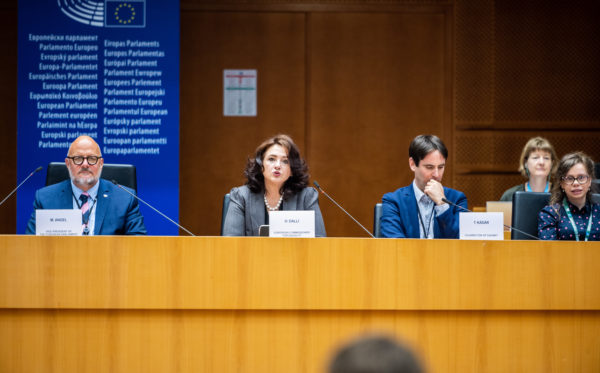
European Parliament’s Vice-President Marc Angel opened the session. He expressed concern about the impact of the cost-of-living crisis on persons with disabilities, especially related to affordable, accessible housing. He asked participants to warn the Parliament if EU Funds are being misused.
Commissioner Dalli, the first panellist, outlined the many barriers that persons with disabilities face, from accessing training, education and employment, to finding affordable housing and support to live independently:
Inequalities in our societies are at the root of social exclusion and poverty.
She lauded the UN Convention on the Rights of Persons with Disabilities and explained how it influenced the current EU Disability Strategy:
- Supporting independent living: the Commission will present guidance on independent living in 2023. In 2024, it will define minimum quality requirements for support services.
- Boosting employment: the Commission presented the Disability Employment package in 2022. The Commissioner stated that “We can no longer afford the loss of human capital resulting from structural barriers which prevent persons with disabilities from entering the labour market.”
- Accessibility: The Commissioner explained that the Commission supports the implementation of existing legislation through EU Funds, verification of national laws and a new European Accessibility Resource Centre, AccessibleEU, that helps countries apply the rules.
Tamara Byrne followed Commissioner Dalli by highlighting how the rights of persons with intellectual disabilities are often ignored. She explained that ratifying the UN Convention on the Rights of Persons with Disabilities often did not lead to real improvement. Tamara spoke about her experience in mainstream education and how it was a rare example of a good experience due to adequate support and non-judgemental educators. However, even then, the government did not see her potential, and she had to advocate to be able to apply for college: “I do not think people realise how the society’s setup can take away my choice on so many things, like where I want to work, what kind of job I want, where I want to live, and who I want to live with.”
She shared her dream of travelling around Europe independently and having a life without needing to rely on family members for support: “I deserve to be treated as an adult, not as a child. My parents can’t provide for me for the rest of my life.”
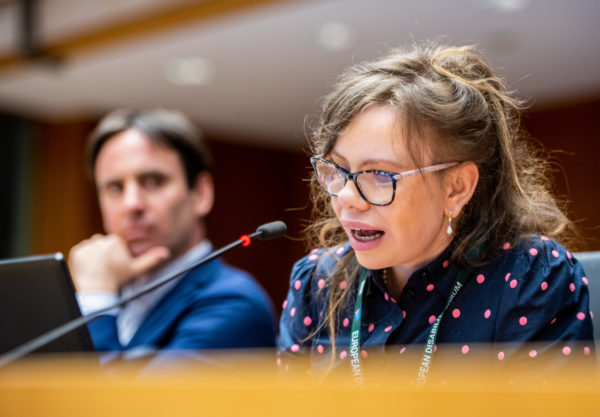
She called on governments to ensure that allowances to cover disability-related extra costs should not be removed when persons with disabilities are in gainful employment.
Carlos Susias, President of the European Anti-Poverty Network, highlighted the significant number of people living in poverty in Europe – 95 million people, and that persons with disabilities are more likely to be in poverty – 29% versus 19% for people without disabilities, which shows a structural issue. He outlined some problems that are contributing to this:
- Unaffordable and inaccessible housing.
- Education – more support must be given to persons with disabilities.
- Lack of focus on gender-specific issues, as women with disabilities are in a worse position than men.
He shared that surveys and studies on poverty do not consider disability as a factor.
He closed his speech by explaining that persons with disabilities experiencing poverty must be involved in all policies related to poverty.
Tamás Kádár, Co-Director of Equinet, outlined the history of anti-discrimination legislation in the European Union, especially since the improvement witnessed in the early 2000s has stalled in the last few years. He shared that a proposal to expand anti-discrimination protection has been blocked since 2008.
He explained the work of equality bodies and how they can support persons with disabilities. They provide protection and redress from discrimination – depending on the country, they can also receive and investigate complaints and take cases to court on behalf of persons with disabilities: “Equality bodies are fighting with you for your rights.”
He concluded by outlining the importance of the recent legislation on Standards for Equality Bodies, which will strengthen and give them more independence.
Markus Schefer, a member of the UN Committee on the Rights of Persons with Disabilities, was the last speaker. He explained how the Committee works and its opinion about the European Union’s efforts. He declared that the UN Convention on the Rights of Persons with Disabilities is binding law, creating legal obligations for the European Union and its Member Countries.
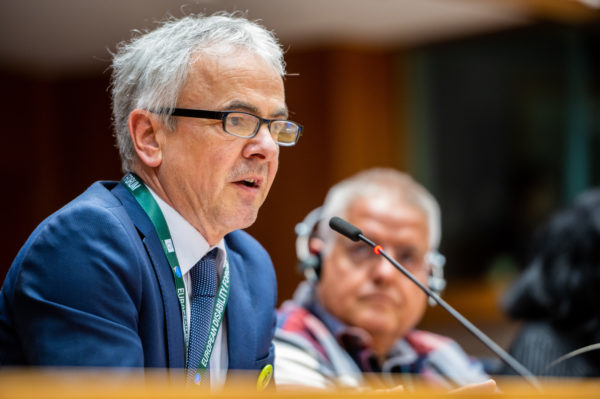
He outlined what the Committee can do, for example, investigating individual complaints (only available for complaints against State Parties that ratified the Optional Protocol, which the EU did not do).
He closed his intervention by urging organisations of persons with disabilities to continue engaging with the UN Committee on the Rights of Persons with Disabilities, including in the upcoming review of the European Union.
Nadia Hadad concluded the session by reinforcing that persons with disabilities still need to fight for each and every right in their daily lives: “A fight to be respected and to be considered and seen as a person.” She called for penalties and enforcement rules for Member States that do not respect the rights of persons with disabilities.
Interventions from the floor
Participants made short interventions from the floor. We highlight the following interventions:
- Gayle Mugliette, a representative from the Maltese delegation, shared the importance of having a personal assistant, which allowed her to be more independent. She shares her wish to exercise the right to vote in secrecy. “I want others to have a life too, without any problems.”
- MEP Abir Al-Sahlani emphasised the need to improve participation in political life, both voting and running as a candidate. She shared accessible issues in Sweden’s polling stations, and promised to work on improving disability rights.
- Timo Juhani Kallioaho intervened on behalf of the European Network of Users and Survivors of Psychiatry. He focused on Obsessive Compulsive Disorder and equal access to state-of-the-art treatments and support to manage it.
- Karīna Krieviņa, a member of the Latvian delegation, spoke about the problems caused by inflation and increased cost of living – including paying for electricity and heating needs. She shared their work on deinstitutionalisation and supporting persons with disabilities with budgeting.
- Sari Kokko, President of the Finnish Disability Forum, focused on independent living and the right to learn, work and be paid fairly.
- Krzysztof Kurowski, a representative from the Polish delegation, spoke about the situation of persons with disabilities and their families in Poland. He focused on how the lack of financial support and support services is keeping Polish persons with disabilities in poverty. Financial help must be disbursed directly to persons with disabilities. Support services must be strengthened, and legislation must be developed with the close involvement of persons with disabilities.
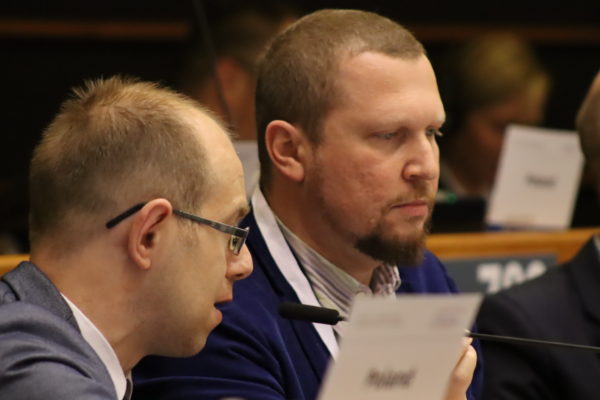
- MEP Beatrice Covassi shared the importance of listening directly to persons with disabilities and committed to supporting lifting barriers for persons with disabilities, including persons with non-visible disabilities. She shared the importance of accessible heritage sites and culture.
- Thorkild Olesen, chairman of the Disabled Peoples’ Organizations Denmark, talked about the issues in guaranteeing passenger rights, especially during air travel. He called attention to the problem of loneliness, which affects persons with disabilities.
- MEP Estrella Durá focused on the inclusion of persons with intellectual disabilities in education and employment. The efforts of the European Parliament on minimum income schemes, which are a basic instrument to improve mental health, were put forward. She concluded by underlining the importance of the EU’s action plan on mental health.
- Florian Sanden spoke on behalf of the European Network on Independent Living. He underlined the disproportionate impact of poverty, and access to housing, on persons with disabilities. He outlined that it often leads to institutionalisation, as there is no choice of affordable housing – or support to access it. He queried the European Commission on how issues of accessible housing will be integrated into the two flagship initiatives regarding guidance to independent living and the framework for social services of excellence.
- MEP Chiara Gemma highlighted the importance of the European Year of Skills in developing access to work.
- Chris Roberts, speaking on behalf of Alzheimer Europe, explained that the rights of persons with Alzheimer’s are not recognised, and countries do not support persons with dementia. He called for more investment and support, including initiatives to raise awareness and educate the general population about it.
- MEP Stelios Kympouropoulos called for more targeted funding for disability rights. He shared his worries about the participation and involvement of the most marginalised groups within the disability community – those living in poverty, in segregated settings, those lacking legal capacity, and living in rural areas. He calls for data collection on the most marginalised groups.
- Khadija Tamditi, a representative from the Belgian delegation, called for more active consultation of persons with disabilities. She shared her concerns about increasing digitalisation, which often excludes persons with disabilities due to inaccessibility.
- Isabelle Flahaut, another representative from the Belgian delegation, called for strict rules and standards on accessible products, especially digital products. She stressed that the European Disability Card must have a physical format and be easy to use.
- Daniela Tontsch, president of the Romanian National Disability Council, explained that the disability allowance in Romania is insufficient and spoke about the prejudicial stereotypes that affect people using them. She called for a guaranteed minimum income for persons with disabilities at the European level.
- MEP Radka Maxová called for a dedicated disability coordinator in each EU institution. She asked for more action on the issues of women and girls with disabilities, for example, on gender-based violence and enjoying the right to education.
- Jorge Manuel Torres Gouveia, representative of the Portuguese delegation, highlighted the need for Member States to implement the Disability Rights Strategy and to attribute funds to it. He said one of the priorities is to reduce the number of persons with disabilities at risk of poverty and that EU Funds should support the implementation of disability rights.
- MEP Maria Walsh reinforced the need to fully participate in the labour market with equal pay. She called for enhancing conditions for unpaid and paid carers. She urged Member States to unblock the Equal Treatment Directive.
- MEP Brando Benifei condemned the enduring violation of the rights of persons with disabilities, especially its systematic violation during the pandemic. He highlighted the specific issues of persons with disabilities that are part of other marginalised groups, such as asylum seekers with disabilities. He outlined issues with Artificial Intelligence, access to services, and EU funds supporting independent living.
Answers from the panel
The moderators thanked the participants for their interventions.
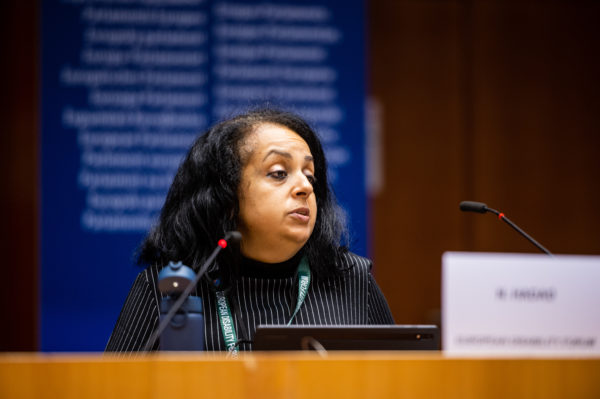
Commissioner Dalli informed the participants that the proposal for the EU Disability Card will be tabled in September. She underlined the need for nationals from all EU countries to receive the same levels of assistance when dealing with discrimination. Persons with disabilities “must be entitled to vote and run as candidates on an equal basis with others.”
Tamara Byrne shared that changes should benefit everyone. She shared that still too many people need to fight every day for their rights and dignity. She asked for a “cost of disability” payment not linked to other income and personal assistants funded by public authorities.
Carlos Susias stated that the fight for equality is an obligation for public institutions, with the support of civil society. He reinforced that persons with disabilities must be involved in all decisions. He asked that allowances ensure people live above the level of poverty.
Tamas Kádár shared that the public authorities and Member States need to focus on a rights-based approach. The commitment and enthusiasm “seem to run out when real actions need to be implemented. And even more when there are costs involved.”
Markus Schefer focused on the need for participation in the state, society, the economy, and decisions around daily life.
Vice-President Marc Angel closed the panel by stating that investment is a key to promoting these rights, and thanked the panellists and participants.